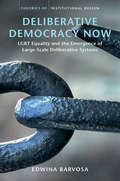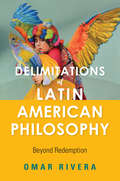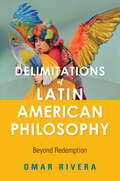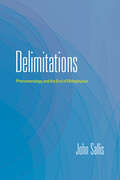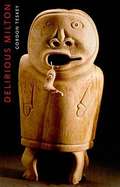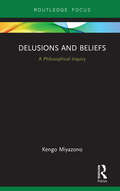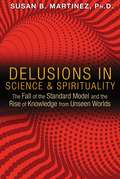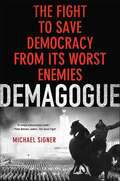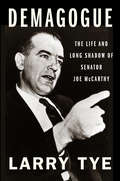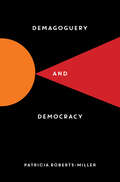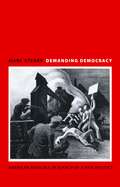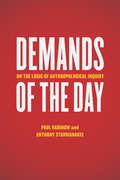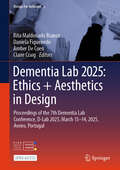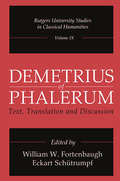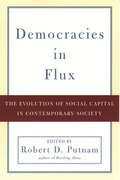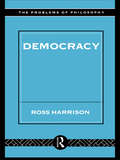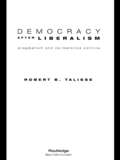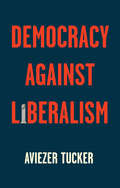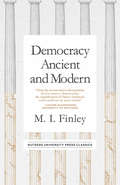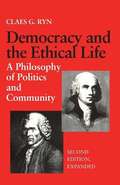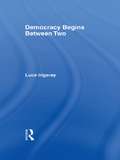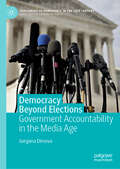- Table View
- List View
Deliberative Democracy Now: Lgbt Equality And The Emergence Of Large-scale Deliberative Systems (Theories Of Institutional Design Ser.)
by Edwina BarvosaWhile millions feel politically marginalized, there is evidence that democracy is evolving into a conversation-based, public-centered practice called deliberative democracy. In this new form of democracy, public discussion, conscious reflection, and collective choice drive democratic governance and have the power to override democratic dysfunction. Illustrating this emerging possibility with examples from 28 years of US public engagement on LGBT equality, this book offers a practical model for the growth of deliberative democracy in which everyone can take part. It identifies the necessary social catalysts, the role of social networks and technology, and key pathways to addressing unconscious bias, hidden fears, and identity based polarization as they were overcome in the LGBT case. It demonstrates how each person can gain voice and influence in a deliberative democracy in which people once again become the true source of political power. This book will interest anyone who cares about the future of democracy.
Delimitations of Latin American Philosophy: Beyond Redemption (World Philosophies)
by Omar RiveraA distinctive focus of 19th- and 20th-century Latin American philosophy is the convergence of identity formation and political liberation in ethnically and racially diverse postcolonial contexts. From this perspective, Omar Rivera interprets how a "we" is articulated and deployed in central political texts of this robust philosophical tradition. In particular, by turning to the work of Peruvian political theorist José Carlos Mariátegui among others, Rivera critiques philosophies of liberation that are invested in the redemption of oppressed identities as conditions for bringing about radical social and political change, foregrounding Latin America's complex histories and socialities to illustrate the power and shortcomings of these projects. Building on this critical approach, Rivera studies interrelated epistemological, transcultural, and aesthetic delimitations of Latin American philosophy in order to explore the possibility of social and political liberation "beyond redemption."
Delimitations of Latin American Philosophy: Beyond Redemption (World Philosophies)
by Omar Rivera“[An] original view of José Carlos Mariátegui’s role in Latin American philosophy and his relation to identity, liberation, and aesthetics (Elizabeth Millán Brusslan, editor of After the Avant-Gardes).In the nineteenth and twentieth centuries, Latin American philosophy focused on the convergence of identity formation and political liberation in ethnically and racially diverse postcolonial contexts. In this book, Omar Rivera interprets how a “we” is articulated and deployed in this robust philosophical tradition. With close readings of Peruvian political theorist José Carlos Mariátegui, he also examines texts by José Martí, Simón Bolívar, and others.Rivera critiques philosophies of liberation that frame the redemption of oppressed identities as a condition for bringing about radical social and political change. Shining a light on Latin America’s complex histories and socialities, he illustrates the power and shortcomings of these projects.Building on this critical approach, Rivera studies interrelated epistemological, transcultural, and aesthetic delimitations of Latin American philosophy in order to explore the possibility of social and political liberation “beyond redemption.”
Delimitations: Phenomenology and the End of Metaphysics (The Collected Writings of John Sallis)
by John SallisSince Hegel, philosophers have declared repeatedly that metaphysics is at an end, a pronouncement that has sparked much contemporary philosophical debate. What exactly does the end, or closure, of metaphysics mean, and what are the implications of this view?John Sallis characterizes the end of metaphysics as a limit, or horizon, both enclosing metaphysical thought and opening the field of thinking beyond it. He elaborates five areas in which the boundaries of thinking are extended: imagination as an opening power, the radicalizing of phenomenology's injunction to attend to the things themselves, Heidegger's shift of thinking toward an opening or clearing, archaic closure through a return to Plato and Heraclitus, and the nonidentity that takes place in the act of delimitation. This last question is developed in relation to Husserl's project of a pure phenomenology, to the debate between hermeneutics and deconstruction, and to the secluding of ground announced in Schelling's thought.
Delirious Milton: The Fate of the Poet in Modernity
by Gordon TeskeyComposed after the collapse of his political hopes, Milton's great poems Paradise Lost, Paradise Regained, and Samson Agonistes are an effort to understand what it means to be a poet on the threshold of a post-theological world. The argument of Delirious Milton, inspired in part by the architectural theorist Rem Koolhaas's Delirious New York, is that Milton's creative power is drawn from a rift at the center of his consciousness over the question of creation itself. This rift forces the poet to oscillate deliriously between two incompatible perspectives, at once affirming and denying the presence of spirit in what he creates. From one perspective the act of creation is centered in God and the purpose of art is to imitate and praise the Creator. From the other perspective the act of creation is centered in the human, in the built environment of the modern world. The oscillation itself, continually affirming and negating the presence of spirit, of a force beyond the human, is what Gordon Teskey means by delirium. He concludes that the modern artist, far from being characterized by what Benjamin (after Baudelaire) called "loss of the aura," is invested, as never before, with a shamanistic spiritual power that is mediated through art.
Delusions and Beliefs: A Philosophical Inquiry (Routledge Focus on Philosophy)
by Kengo MiyazonoWhat sort of mental state is a delusion? What causes delusions? Why are delusions pathological? This book examines these questions, which are normally considered separately, in a much-needed exploration of an important and fascinating topic, Kengo Miyazono assesses the philosophical, psychological and psychiatric literature on delusions to argue that delusions are malfunctioning beliefs. Delusions belong to the same category as beliefs but - unlike healthy irrational beliefs - fail to play the function of beliefs. Delusions and Beliefs: A Philosophical Inquiry will be of great interest to students of philosophy of mind and psychology and philosophy of mental disorder, as well as those in related fields such as mental health and psychiatry.
Delusions in Science and Spirituality: The Fall of the Standard Model and the Rise of Knowledge from Unseen Worlds
by Susan B. MartinezDebunks cherished theories of mainstream consensus and reveals the deeper mysteries of the science of the unseen • Reveals a new “Theory of Everything” to replace the standard model and complete our knowledge of Earth Science, anthropology, psychology, and spirituality • Explains the failings of the Big Bang, evolution, ice age theory, and global warming • Shows how the Freudian and Jungian theories of the unconscious have grossly misrepresented the spirit of man and the psyche of humanity What if science and society’s most darling theories, taught as fact, were 100% wrong? What if the anomalies that disprove these theories were covered up and distorted and any serious challenges brushed off as lunacy, hysteria, junk science, and dissension? In this primer in deprogramming, Susan B. Martinez reveals the disinformation at the root of mainstream consensus thinking. She punches gaping holes in the cherished theories of the Big Bang, Darwinian evolution, ice ages, and global warming. Drawing on the ancient science of the unseen and revelations from the Oahspe Bible as well as some of the most advanced thinkers in astrophysics, she explains a new “Theory of Everything” to replace the standard model. She explores the concept of vortexya, the cosmic whirlwind of our own geomagnetic field, which explains quite simply the subtle changes that take place on Earth and in the universe over time without the “magical thinking” of the Big Bang, global warming, or ice ages. Martinez reveals how the instability of society itself has found its way into our theories, positing explosive change and acceleration where there is none. She explains how homo sapiens’ evolution did not suddenly accelerate 40,000 years ago and culture did not accelerate to birth civilization a mere 6,000 years ago. She shows how the theories of the Freudian and Jungian unconscious and of reincarnation have grossly misrepresented the spirit of man and the psyche of humanity. Resurrecting the majestic order that was once recognized at the basis of reality, Martinez shows that the shift from the Age of Disinformation to the Age of Understanding is well underway.
Demagogue: The Fight to Save Democracy from Its Worst Enemies
by Michael SignerA demagogue is a tyrant who owes his initial rise to the democratic support of the masses. Huey Long, Hugo Chavez, and Moqtada al-Sadr are all clear examples of this dangerous byproduct of democracy. Demagogue takes a long view of the fight to defend democracy from within, from the brutal general Cleon in ancient Athens, the demagogues who plagued the bloody French Revolution, George W. Bush's naïve democratic experiment in Iraq, and beyond. This compelling narrative weaves stories about some of history's most fascinating figures, including Adolf Hitler, Senator Joe McCarthy, and General Douglas Macarthur, and explains how humanity's urge for liberty can give rise to dark forces that threaten that very freedom. To find the solution to democracy's demagogue problem, the book delves into the stories of four great thinkers who all personally struggled with democracy--Plato, Alexis de Tocqueville, Leo Strauss, and Hannah Arendt.
Demagogue: The Life and Long Shadow of Senator Joe McCarthy
by Larry TyeThe definitive biography of the most dangerous demagogue in American history, based on first-ever review of his personal and professional papers, medical and military records, and recently unsealed transcripts of his closed-door Congressional hearings In the long history of American demagogues, from Huey Long to Donald Trump, never has one man caused so much damage in such a short time as Senator Joseph McCarthy. We still use &“McCarthyism&” to stand for outrageous charges of guilt by association, a weapon of polarizing slander. From 1950 to 1954, McCarthy destroyed many careers and even entire lives, whipping the nation into a frenzy of paranoia, accusation, loyalty oaths, and terror. When the public finally turned on him, he came crashing down, dying of alcoholism in 1957. Only now, through bestselling author Larry Tye&’s exclusive look at the senator&’s records, can the full story be told.Demagogue is a masterful portrait of a human being capable of immense evil, yet beguiling charm. McCarthy was a tireless worker and a genuine war hero. His ambitions knew few limits. Neither did his socializing, his drinking, nor his gambling. When he finally made it to the Senate, he flailed around in search of an agenda and angered many with his sharp elbows and lack of integrity. Finally, after three years, he hit upon anti-communism. By recklessly charging treason against everyone from George Marshall to much of the State Department, he became the most influential and controversial man in America. His chaotic, meteoric rise is a gripping and terrifying object lesson for us all. Yet his equally sudden fall from fame offers reason for hope that, given the rope, most American demagogues eventually hang themselves.
Demagoguery and Democracy
by Patricia Roberts-MillerA clear-eyed guide to demagoguery—and how we can defeat it What is demagoguery? Some demagogues are easy to spot: They rise to power through pandering, charisma, and prejudice. But, as professor Patricia Roberts-Miller explains, a demagogue is anyone who reduces all questions to us vs. them. Why is it dangerous? Demagoguery is democracy’s greatest threat. It erodes rational debate, so that intelligent policymaking grinds to a halt. The idea that we never fall for it—that all the blame lies with them—is equally dangerous. How can we stop it? Demagogues follow predictable patterns in what they say and do to gain power. The key to resisting demagoguery is to name it when you see it—and to know where it leads.
Demanding Democracy: American Radicals in Search of a New Politics
by Marc StearsWhat today's political thinkers can learn from the radical democratic movements of twentieth-century AmericaThis is a major work of history and political theory that traces radical democratic thought in America across the twentieth century, seeking to recover ideas that could reenergize democratic activism today. The question of how citizens should behave as they struggle to create a more democratic society has haunted the United States throughout its history. Should citizens restrict themselves to patient persuasion or take to the streets and seek to impose change? Marc Stears argues that anyone who continues to wrestle with these questions could learn from the radical democratic tradition that was forged in the twentieth century by political activists, including progressives, trade unionists, civil rights campaigners, and members of the student New Left.These activists and their movements insisted that American campaigners for democratic change should be free to strike out in whatever ways they thought necessary, so long as their actions enhanced the political virtues of citizens and contributed to the eventual triumph of the democratic cause. Reevaluating the moral and strategic arguments, and the triumphs and excesses, of this radical democratic tradition, Stears contends that it still offers a compelling account of citizen behavior—one that is fairer, more inclusive, and more truly democratic than those advanced by political theorists today.
Demands of the Day: On the Logic of Anthropological Inquiry
by Paul Rabinow Anthony StavrianakisDemands of the Day asks about the logical standards and forms that should guide ethical and experimental anthropology in the twenty-first century. Anthropologists Paul Rabinow and Anthony Stavrianakis do so by taking up Max Weber's notion of the "demands of the day. " Just as the demand of the day for anthropology decades ago consisted of thinking about fieldwork, today, they argue, the demand is to examine what happens after, how the experiences of fieldwork are gathered, curated, narrated, and ultimately made available for an anthropological practice that moves beyond mere ethnographic description. Rabinow and Stavrianakis draw on experiences from an innovative set of anthropological experiments that investigated how and whether the human and biological sciences could be brought into a mutually enriching relationship. Conceptualizing the anthropological and philosophic ramifications of these inquiries, they offer a bold challenge to contemporary anthropology to undertake a more rigorous examination of its own practices, blind spots, and capacities, in order to meet the demands of our day.
Dementia Lab 2025: Proceedings of the 7th Dementia Lab Conference, D-Lab 2025, March 13–14, 2025, Aveiro, Portugal (Design For Inclusion #5)
by Claire Craig Rita Maldonado Branco Daniela Figueiredo Amber De CoenThis is an open access book. It gathers revised and selected contributions to the 7th Dementia Lab Conference, D-Lab 2025, held on March 13–14, 2025, in Aveiro, Portugal, reporting on innovative research aimed at improving the lives of people with dementia, their loved ones, and their caregivers. This edition addresses the theme of ethics + aesthetics in design. Ethics emphasize justice, advocate for inclusive, person-centred practices, and challenge societal stigmas. Aesthetics, beyond beauty, focus on sensory and emotional engagement, which becomes increasingly significant as dementia progresses. Together, these principles guide innovative design approaches that enhance care, identity, and connection. Being organized into three themes, Designing with People with Dementia, Including Design in Dementia Care, and Design within Cultures of Care, this collection highlights research on participation, technology, and the cultural dimensions of care. It also demonstrates the key role of design in creating products and environments that embrace aesthetic value and is expected to challenge stigmas and unrealistic assumptions about people living with dementia
Demetrius of Phalerum: Text, Translation and Discussion (Rutgers University Studies in Classical Humanities)
by Eckart SchütrumpfDemetrius of Phalerum (c. 355-280BCE) of Phalerum was a philosopher-statesman. He studied in the Peripatos under Theophrastus and subsequently used his political influence to help his teacher acquire property for the Peripatetic school. As overseer of Athens, his governance was characterized by a decade of domestic peace. Exiled to Alexandria in Egypt, he became the adviser of Ptolemy. He is said to have been in charge of legislation, and it is likely that he influenced the founding of the Museum and the Library.This edition of the fragments of Demetrius of Phalerum reflects the growing interest in the Hellenistic period and the philosophical schools of that age. As a philosopher-statesman, Demetrius appears to have combined theory and practice. For example, in the work On Behalf of the Politeia, he almost certainly explained his own legislation and governance by appealing to the Aristotelian notion of politeia, that is, a constitution in which democratic and oligarchic elements are combined. In On Peace, he may have defended his subservience to Macedon by appealing to Aristotle, who repeatedly recognized the importance of peace over war; and in On Fortune, he will have followed Theophrastus, emphasizing the way fortune can determine the success or failure of sound policy. Whatever the case concerning any one title, we can well understand why Cicero regarded Demetrius as a unique individual: the educated statesman who was able to bring learning out of the shadows of erudition into the light of political conflict, and that despite an oratorical style more suited to the shadows of the Peripatos then to political combat.The new edition of secondary reports by Stork, van Ophuijsen, and Dorandi brings together the evidence for these and other judgments. The facing translation which accompanies the Greek and Latin texts opens up the material to readers who lack the ancient languages, and the accompanying essays introduce us to important issues. The volume will be of interest to those interested in Greek literature, Hellenistic philosophy, Hellenistic history, and generally to persons captivated by the notion of philosopher-statesman.
Democracies in Flux: The Evolution of Social Capital in Contemporary Society
by Robert D. PutnamIn his national bestseller Bowling Alone, Robert Putnam illuminated the decline of social capital in the US. Now, in Democracies in Flux, Putnam brings together a group of leading scholars who broaden his findings as they examine the state of social capital in eight advanced democracies around the world. The book is packed with many intriguing revelations. The contributors note, for instance, that waning participation in unions, churches, and political parties seems to be virtually universal, a troubling discovery as these forms of social capital are especially important for empowering less educated, less affluent portions of the population. Indeed, in general, the researchers found more social grouping among the affluent than among the working classes and they find evidence of a younger generation that is singularly uninterested in politics, distrustful both of politicians and of others, cynical about public affairs, and less inclined to participate in enduring social organizations. Yet social capital appears as strong as ever in Sweden, where 40% of the adult population participate in "study circles"--small groups who meet weekly for educational discussions. Social capital--good will, fellowship, sympathy, and social intercourse--is vitally important both for the health of our communities and for our own physical and psychological well being. Offering a panoramic look at social capital around the world, this book makes an important contribution to our understanding of these phenomena and why they are important in today's world.
Democracy
by David A. MossHistorian David Moss adapts the case study method made famous by Harvard Business School to revitalize our conversations about governance and democracy and show how the United States has often thrived on political conflict. These 19 cases ask us to weigh choices and consequences, wrestle with momentous decisions, and come to our own conclusions.
Democracy & the Political in Max Weber's Thought
by Terry MaleyMax Weber is best known as one of the founders of modern sociology and the author of the Protestant Ethic and the Spirit of Capitalism, but he also made important contributions to modern political and democratic theory. In Democracy and the Political in Max Weber's Thought, Terry Maley explores, through a detailed analysis of Weber's writings, the intersection of recent work on Weber and on democratic theory, bridging the gap between these two rapidly expanding areas of scholarship.Maley critically examines how Weber's realist 'model' of democracy defines and constrains the possibilities for democratic agency in modern liberal-democracies. Maley also looks at how ideas of historical time and memory are constructed in his writings on religion, bureaucracy, and the social sciences. Democracy and the Political in Max Weber's Thought is both an accessible introduction to Weber's political thought and a spirited defense of its continued relevance to debates on democracy.
Democracy (Problems of Philosophy)
by Ross HarrisonDemocracy surrounds us like the air we breath, and is normally taken very much for granted. Across the world democracy has become accepted as an unquestionably good thing. Yet upon further examination the merits of democracy are both paradoxical and problematic, and the treasured values of liberty and equality can be used to argue both for and against it.In the historical section of the book, Ross Harrison clearly traces the history of democracy by examining the works of, amongst others, Plato and Aristotle, Hegel and Marx. Informed by facts and detailed knowledge of these famous thinkers, Harrison provides a clear and cogent justification of democracy.
Democracy After Liberalism: Pragmatism and Deliberative Politics
by Robert TalisseThis book critically evaluates liberalism, the dominant attempt in the tradition of political philosophy to provide a philosophical foundation for democracy, and argues for a conception of deliberative democracy to meet this need.
Democracy Against Liberalism: Its Rise and Fall
by Aviezer TuckerIt should not surprise anyone that democracies can become dangerously illiberal; indeed, it was one of the classical critiques of ancient democracies. Is the contemporary backlash against liberal democracy merely the same old story, or are we witnessing something unprecedented? In this witty and engaging book, Aviezer Tucker argues that the contemporary revival of authoritarian populism combines the historically familiar with new technologies to produce a highly unstable and contagious new synthesis that threatens basic liberal norms, from freedom of the press to independent judiciaries. He examines how the economic crisis blocked social mobility and thereby awakened the dark, dormant political passions exploited by demagogues such as Orban and Trump. He argues that this slide towards ‘neo-illiberal democracy’ can be countered if we hard-headedly restore a ‘liberalism without nostalgia’ which institutes policies that can dampen down populist passions and strengthen liberal institutional barriers against them. Readers interested in current affairs, social science, history, and political and social theory will find Aviezer Tucker’s original theoretical and historical analysis incisive, innovative, and entertaining.
Democracy Ancient and Modern (Mason Welch Gross Lecture Series)
by M. I. FinleyWestern democracy is now at a critical juncture. Some worry that power has been wrested from the people and placed in the hands of a small political elite. Others argue that the democratic system gives too much power to a populace that is largely ill-informed and easily swayed by demagogues. This classic study of democratic principles is thus now more relevant than ever. A renowned historian of antiquity and political philosophy, Sir M.I. Finley offers a comparative analysis of Greek and modern conceptions of democracy. As he puts the ancient Greeks in dialogue with their contemporary counterparts, Finley tackles some of the most pressing issues of our day, including public apathy, partisanship, consensus politics, distrust of professional politicians, and the limits of free speech. Including three lectures that Finley delivered at Rutgers University, plus two additional essays that further illuminate his thinking, Democracy Ancient and Modern explores the dramatic differences between the close-knit civil society of the ancient Greeks and our own atomized mass societies. By mapping out democracy’s past and its present manifestations, this book helps us plot a course for democracy’s future.
Democracy And The Ethical Life: A Philosophy Of Politics And Community (Second Edition, Expanded)
by Claes G. RynThis study goes to the heart of ethics and politics. Strongly argued and lucidly written, the book makes a crucial distinction between two forms of democracy
Democracy Begins Between Two (Athlone Contemporary European Thinkers Ser.)
by Luce IrigarayIn Democracy Begins Between Two, Luce Irigaray calls for a form of specific civil rights guaranteeing women a separate civil identity of their own equivalent to-though not simply the same as-that enjoyed by men.
Democracy Beyond Elections: Government Accountability in the Media Age (Challenges to Democracy in the 21st Century)
by Gergana DimovaThis book provides the analytical framework for understanding the relationship between media scandals, executive accountability and the crisis of democracy. The empirical findings are based on an original database of 6000 media allegations and investigations in Russia, Germany and Bulgaria. Observations gained from the case studies are then placed in relation to a systematic analysis and critique of more than 100 models of the transformation and crisis of democracy. The book will be of particular interest to researchers focusing on democratic theory and political thought, as well as those working empirically in the field of democratic systems.
Democracy Disfigured
by Nadia UrbinatiIn "Democracy Disfigured, "Nadia Urbinati diagnoses the ills that beset the body politic in an age of hyper-partisanship and media monopolies and offers a spirited defense of the messy compromises and contentious outcomes that define democracy. Urbinati identifies three types of democratic disfiguration: the unpolitical, the populist, and the plebiscitarian. Each undermines a crucial division that a well-functioning democracy must preserve: the wall separating the free forum of public opinion from the governmental institutions that enact the will of the people. Unpolitical democracy delegitimizes political opinion in favor of expertise. Populist democracy radically polarizes the public forum in which opinion is debated. And plebiscitary democracy overvalues the aesthetic and nonrational aspects of opinion. For Urbinati, democracy entails a permanent struggle to make visible the issues that citizens deem central to their lives. Opinion is thus a form of action as important as the mechanisms that organize votes and mobilize decisions. Urbinati focuses less on the overt enemies of democracy than on those who pose as its friends: technocrats wedded to procedure, demagogues who make glib appeals to "the people," and media operatives who, given their preference, would turn governance into a spectator sport and citizens into fans of opposing teams.
